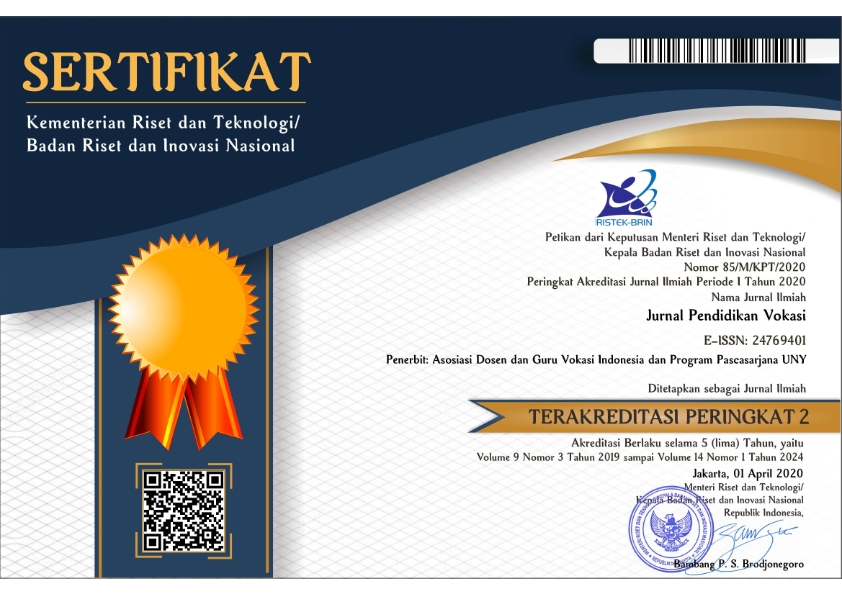Analysis of improving innovative work behaviour of vocational high school teachers in terms of servant leadership with knowledge sharing as an intervening variable
Sumaryati Tjitrosumarto, Universitas Indraprasta PGRI, Indonesia
J. Sabas Setyohadi, Universitas Indraprasta PGRI, Indonesia
Sri Hapsari, Universitas Indraprasta PGRI, Indonesia
Ira Pratiwi Ramdayana, Universitas Indraprasta PGRI, Indonesia
Abstract
Keywords
Full Text:
PDFReferences
Akram, T., Lei, S., Haider, M. J., & Hussain, S. T. (2020). The impact of organizational justice on employee innovative work behavior: Mediating role of knowledge sharing. Journal of Innovation & Knowledge, 5(2), 117–129. https://doi.org/10.1016/j.jik.2019.10.001
Asurakkody, T. A., & Kim, S. H. (2020). Effects of knowledge sharing behavior on innovative work behavior among nursing Students: Mediating role of Self-leadership. International Journal of Africa Nursing Sciences, 12, 100190. https://doi.org/10.1016/j.ijans.2020.100190
Blašková, M., Blaško, R., Jankalová, M., & Jankal, R. (2014). Key personality competences of university teacher: Comparison of requirements defined by teachers and/versus defined by students. Procedia - Social and Behavioral Sciences, 114, 466–475. https://doi.org/10.1016/j.sbspro.2013.12.731
Burden, K., Kearney, M., Schuck, S., & Hall, T. (2019). Investigating the use of innovative mobile pedagogies for school-aged students: A systematic literature review. Computers & Education, 138, 83–100. https://doi.org/10.1016/j.compedu.2019.04.008
Colakoglu, S., Chung, Y., & Ceylan, C. (2022). Collaboration-based HR systems and innovative work behaviors: The role of information exchange and HR system strength. European Management Journal, 40(4), 518–531. https://doi.org/10.1016/j.emj.2021.07.011
Coun, M. J. H., Peters, P., & Blomme, R. J. (2019). ‘Let’s share!’ The mediating role of employees’ self-determination in the relationship between transformational and shared leadership and perceived knowledge sharing among peers. European Management Journal, 37(4), 481–491. https://doi.org/10.1016/j.emj.2018.12.001
Craig, C. J., Zou, Y., & Curtis, G. (2018). The developing knowledge and identity of an Asian-American teacher: The influence of a China study abroad experience. Learning, Culture and Social Interaction, 17, 1–20. https://doi.org/10.1016/j.lcsi.2017.09.002
Cummings, J. N. (2004). Work groups, structural diversity, and knowledge sharing in a global organization. Management Science, 50(3), 352–364. https://doi.org/10.1287/mnsc.1030.0134
Dahiya, R., & Raghuvanshi, J. (2022). Validation of innovative work behaviour scale: Indian apparel manufacturing sector. Asia Pacific Management Review, 27(2), 120–136. https://doi.org/10.1016/j.apmrv.2021.06.002
De Jong, J., & Den Hartog, D. (2010). Measuring innovative work behaviour. Creativity and Innovation Management, 19(1), 23–36. https://doi.org/10.1111/j.1467-8691.2010.00547.x
Dincer, H., Gencer, G., Orhan, N., & Sahinbas, K. (2011). The significance of emotional intelligence on the innovative work behavior of managers as strategic decision-makers. Procedia - Social and Behavioral Sciences, 24, 909–919. https://doi.org/10.1016/j.sbspro.2011.09.052
Elrehail, H. (2018). The relationship among leadership, innovation and knowledge sharing: A guidance for analysis. Data in Brief, 19, 128–133. https://doi.org/10.1016/j.dib.2018.04.138
Eva, N., Robin, M., Sendjaya, S., van Dierendonck, D., & Liden, R. C. (2019). Servant leadership: A systematic review and call for future research. The Leadership Quarterly, 30(1), 111–132. https://doi.org/10.1016/j.leaqua.2018.07.004
Fraser, S., Beswick, K., & Crowley, S. (2019). Making tacit knowledge visible: Uncovering the knowledge of science and mathematics teachers. Teaching and Teacher Education, 86, 102907. https://doi.org/10.1016/j.tate.2019.102907
Greasley, P. E., & Bocârnea, M. C. (2014). The relationship between personality type and the servant leadership characteristic of empowerment. Procedia - Social and Behavioral Sciences, 124, 11–19. https://doi.org/10.1016/j.sbspro.2014.02.454
Hakanen, J. J., Bakker, A. B., & Schaufeli, W. B. (2006). Burnout and work engagement among teachers. Journal of School Psychology, 43(6), 495–513. https://doi.org/10.1016/j.jsp.2005.11.001
Harris, L. (2011). Secondary teachers’ conceptions of student engagement: Engagement in learning or in schooling? Teaching and Teacher Education, 27(2), 376–386. https://doi.org/10.1016/j.tate.2010.09.006
Hou, H.-T., Sung, Y.-T., & Chang, K.-E. (2009). Exploring the behavioral patterns of an online knowledge-sharing discussion activity among teachers with problem-solving strategy. Teaching and Teacher Education, 25(1), 101–108. https://doi.org/10.1016/j.tate.2008.07.006
Howell, J. B., & Saye, J. W. (2016). Using lesson study to develop a shared professional teaching knowledge culture among 4th grade social studies teachers. The Journal of Social Studies Research, 40(1), 25–37. https://doi.org/10.1016/j.jssr.2015.03.001
Kakhki, M. K., Hadadian, A., Joyame, E. N., & Asl, N. M. (2020). Understanding librarians’ knowledge sharing behavior: The role of organizational climate, motivational drives and leadership empowerment. Library & Information Science Research, 42(1), 100998. https://doi.org/10.1016/j.lisr.2019.100998
Kırkgöz, Y. (2008). A case study of teachers’ implementation of curriculum innovation in English language teaching in Turkish primary education. Teaching and Teacher Education, 24(7), 1859–1875. https://doi.org/10.1016/j.tate.2008.02.007
Korzilius, H., Bücker, J. J. L. E., & Beerlage, S. (2017). Multiculturalism and innovative work behavior: The mediating role of cultural intelligence. International Journal of Intercultural Relations, 56, 13–24. https://doi.org/10.1016/j.ijintrel.2016.11.001
Kuril, S., Maun, D., & Chand, V. S. (2023). Measuring teacher innovative behavior: A validated multidimensional inventory for use with public school teachers. International Journal of Educational Management, 37(2), 393–416. https://doi.org/10.1108/IJEM-03-2022-0095
Kwon, K., & Kim, T. (2020). An integrative literature review of employee engagement and innovative behavior: Revisiting the JD-R model. Human Resource Management Review, 30(2), 100704. https://doi.org/10.1016/j.hrmr.2019.100704
Liden, R. C., Wayne, S. J., Zhao, H., & Henderson, D. (2008). Servant leadership: Development of a multidimensional measure and multi-level assessment. The Leadership Quarterly, 19(2), 161–177. https://doi.org/10.1016/j.leaqua.2008.01.006
Lin, F., Lin, S., & Huang, T. (2008). Knowledge sharing and creation in a teachers’ professional virtual community. Computers & Education, 50(3), 742–756. https://doi.org/10.1016/j.compedu.2006.07.009
Mâţă, L., & Suciu, A. I. (2011). Curricular innovative model focused on developing pedagogical competences of teachers of language and communication. Procedia - Social and Behavioral Sciences, 12, 274–282. https://doi.org/10.1016/j.sbspro.2011.02.036
Mphahlele, L. K., & Rampa, S. H. (2014). Cluster system: An innovative network for teacher development. Procedia - Social and Behavioral Sciences, 116, 3131–3134. https://doi.org/10.1016/j.sbspro.2014.01.721
Nasongkhla, J., & Sujiva, S. (2015). Teacher competency development: Teaching with tablet technology through Classroom Innovative Action Research (CIAR) coaching process. Procedia - Social and Behavioral Sciences, 174, 992–999. https://doi.org/10.1016/j.sbspro.2015.01.723
Nguyen, D., Pietsch, M., & Gümüş, S. (2021). Collective teacher innovativeness in 48 countries: Effects of teacher autonomy, collaborative culture, and professional learning. Teaching and Teacher Education, 106, 103463. https://doi.org/10.1016/j.tate.2021.103463
Örnek, A. Ş., & Ayas, S. (2015). The relationship between intellectual capital, innovative work behavior and business performance reflection. Procedia - Social and Behavioral Sciences, 195, 1387–1395. https://doi.org/10.1016/j.sbspro.2015.06.433
Pastore, S., & Andrade, H. L. (2019). Teacher assessment literacy: A three-dimensional model. Teaching and Teacher Education, 84, 128–138. https://doi.org/10.1016/j.tate.2019.05.003
Prasetyono, H., Abdillah, A., & Fitria, D. (2018). Academic supervision toward teacher’s performance through motivation as intervening variable. Journal of Education and Learning (EduLearn), 12(2), 188–197. https://doi.org/10.11591/edulearn.v12i2.7324
Prasetyono, H., Abdillah, A., Widiarto, T., & Sriyono, H. (2018). Improving student’s affective competencies (minimizing hoax) through the implementation of character-based economic learning and teacher’s reinforcement. Jurnal Cakrawala Pendidikan, 37(3), 426–435. https://doi.org/10.21831/cp.v38i3.21583
PytlikZillig, L. M., Horn, C. A., Bruning, R., Bell, S., Liu, X., Siwatu, K. O., Bodvarsson, M. C., Kim, D., & Carlson, D. (2011). Face-to-face versus computer-mediated discussion of teaching cases: Impacts on preservice teachers’ engagement, critical analyses, and self-efficacy. Contemporary Educational Psychology, 36(4), 302–312. https://doi.org/10.1016/j.cedpsych.2011.07.002
Rachmawati, A. W., & Lantu, D. C. (2014). Servant leadership theory development & measurement. Procedia - Social and Behavioral Sciences, 115, 387–393. https://doi.org/10.1016/j.sbspro.2014.02.445
Ramdayana, I. P., & Prasetyono, H. (2022). Innovative work behavior guru sekolah menengah kejuruan. JUPEIS : Jurnal Pendidikan Dan Ilmu Sosial, 1(1), 60–69. https://doi.org/10.55784/jupeis.Vol1.Iss1.41
Shanker, R., Bhanugopan, R., van der Heijden, B. I. J. M., & Farrell, M. (2017). Organizational climate for innovation and organizational performance: The mediating effect of innovative work behavior. Journal of Vocational Behavior, 100, 67–77. https://doi.org/10.1016/j.jvb.2017.02.004
Spanuth, T., & Wald, A. (2017). How to unleash the innovative work behavior of project staff? The role of affective and performance-based factors. International Journal of Project Management, 35(7), 1302–1311. https://doi.org/10.1016/j.ijproman.2017.07.002
Sriratanaviriyakul, N., & El-Den, J. (2017). Motivational factors for knowledge sharing using pedagogical discussion cases: students, educators, and environmental factors. Procedia Computer Science, 124, 287–299. https://doi.org/10.1016/j.procs.2017.12.158
Sriratanaviriyakul, N., & El-Den, J. (2019). Pedagogical discussion cases in higher education: The role of knowledge sharing in students’ learning. Procedia Computer Science, 161, 215–225. https://doi.org/10.1016/j.procs.2019.11.117
Subramaniam, K. (2020). A place-based education analysis of prospective teachers’ prior knowledge of science instruction in informal settings. International Journal of Educational Research, 99, 101497. https://doi.org/10.1016/j.ijer.2019.101497
Sudibjo, N., & Prameswari, R. K. (2021). The effects of knowledge sharing and person–organization fit on the relationship between transformational leadership on innovative work behavior. Heliyon, 7(6), e07334. https://doi.org/10.1016/j.heliyon.2021.e07334
Suleimanova, S. (2013). Innovative activity of the teacher: In the course of his professional formation. Procedia - Social and Behavioral Sciences, 81, 395–399. https://doi.org/10.1016/j.sbspro.2013.06.449
Taştan, S. B., & Davoudi, S. M. M. (2015). An examination of the relationship between leader-member exchange and innovative work behavior with the moderating role of trust in leader: A study in the Turkish context. Procedia - Social and Behavioral Sciences, 181, 23–32. https://doi.org/10.1016/j.sbspro.2015.04.862
van Bommel, J., Randahl, A.-C., Liljekvist, Y., & Ruthven, K. (2020). Tracing teachers’ transformation of knowledge in social media. Teaching and Teacher Education, 87, 102958. https://doi.org/10.1016/j.tate.2019.102958
Wijayanto, A. D., Fajriah, S. N., & Anita, I. W. (2018). Analisis kemampuan komunikasi matematis siswa SMP ada materi segitiga dan segiempat. Jurnal Cendekia : Jurnal Pendidikan Matematika, 2(1), 97–104. https://doi.org/10.31004/cendekia.v2i1.36
Yassin, F., Salim, J., & Ashaari, N. S. (2013). The influence of organizational factors on knowledge sharing using ICT among teachers. Procedia Technology, 11, 272–280. https://doi.org/10.1016/j.protcy.2013.12.191
DOI: https://doi.org/10.21831/jpv.v14i1.65445
Refbacks
- There are currently no refbacks.

This work is licensed under a Creative Commons Attribution-ShareAlike 4.0 International License.
Our journal indexed by:
















